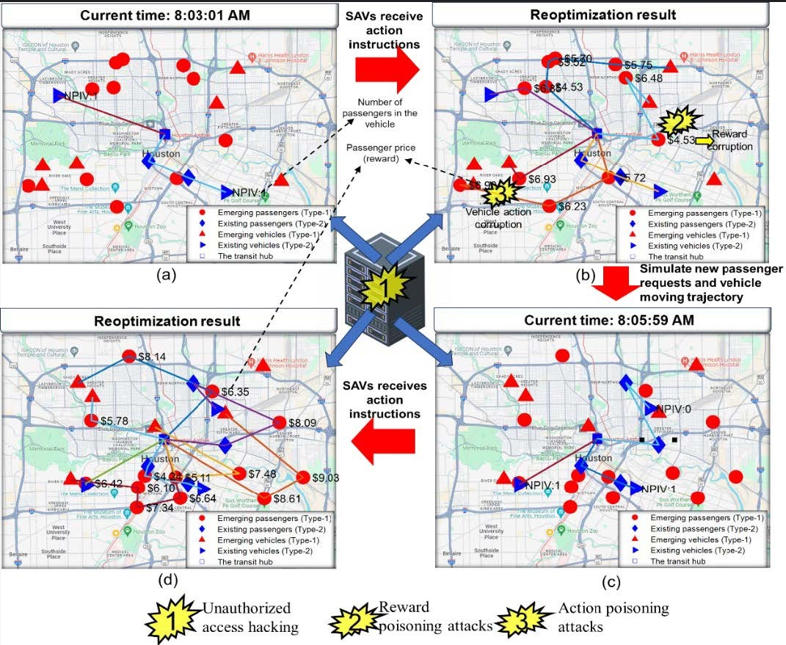Lead PI: Zheyong Bian
Federal Fund Allocation (Year 2024-2025): $32,000
Project Description
Shared Autonomous Vehicles (SAVs) represent a transformative innovation, providing
an efficient and convenient alternative to traditional modes of transportation. The
process of automatically paring passengers in real-time with the best autonomous vehicle,
maximizing service rewards, is known as the online vehicle-passenger (VP) matching
problem, crucial for enhancing the quality and efficiency of SAV ridesharing services.
Due to the unknown/uncertain rewards of each vehicle on serving different passengers,
conventional optimization models are inadequate to solve the online VP matching problem.
Recent advances in AI algorithms have provided more efficient and effective solutions
for the online VP matching problem. Nevertheless, the complex and shared nature of
SAV operations renders them more susceptible to cyberattacks. Hence, it is imperative
to prioritize the enhancement of privacy and resilience in online VP matching algorithms.
Most existing online vehicle–passenger matching algorithms rely on a centralized
framework—creating significant privacy leakage risks and scalability bottlenecks—so
it is imperative to develop federated approaches that keep data decentralized and
push learning to local vehicles; meanwhile, transmission of matching and reward signals
remains vulnerable to adversarial interception and tampering, which can mislead models
or directly alter their actions, necessitating built-in robustness against such attacks;
furthermore, no comprehensive simulation platform currently exists to evaluate and
quantify how well these algorithms preserve privacy, maintain resilience, and uphold
service quality under cybersecurity measures. Hence, the development of reliable and
robust online vehicle-passenger (VP) matching algorithms remains a challenge. This
research contributes to advancing state-of-the-art methodologies aimed at enhancing
cybersecurity in SAVs across three key aspects.
• Enhancing privacy preservation of the SAV ridesharing service by designing
a Federated Collaborative Kernel Bandit Framework for decentralized online VP matching,
simultaneously guaranteeing the efficiency and quality of SAV service.
• Strengthen cyber resilience against adversarial attacks through the design of
a Robust Collaborative Bandit Framework for online VP matching mechanisms.
• Creating the SAV Ridesharing Cybersecurity Simulation Tool (SAVR-CS), which
incorporates diverse cyberattack scenarios, to serve as a testbed for evaluating VP
matching mechanisms. This tool assesses the cybersecurity resilience and operational
efficiency and quality of SAV services.
